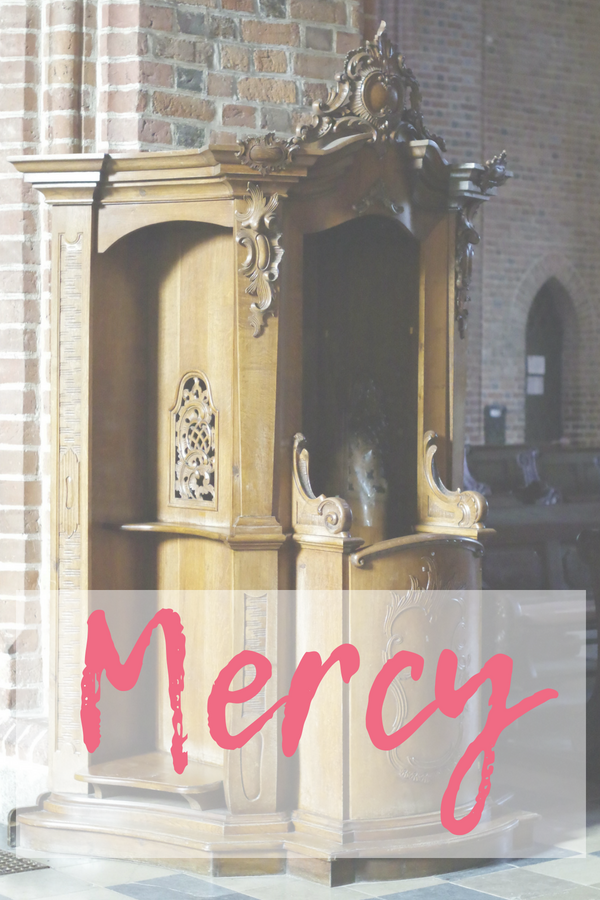In honor of our Scripture Writing Plan focusing on God’s mercy, I’m publishing a guest post by a former pastor on mercy today. If you haven’t printed your Write the Word Mercy Plan, it’s free for email friends of The Littlest Way. Click here to subscribe.
When we speak of “mercy” what exactly do we mean? Some people might think that when we say God is “merciful” we mean that we can do whatever we want and God will simply forgive us and so we don’t have to worry about going to hell. But, “mercy” doesn’t mean that God forgets His Justice.
Mercy is defined as “compassion or forgiveness shown toward someone whom it is in one’s power to punish or harm.” And so for example, if an enemy is caught and placed in a jail and sentenced to death, the judge might in “mercy” show forgiveness and not carry through with the punishment. God is certainly a Just God and He certainly has the power to carry out a just punishment for anyone who sins. Since all of us have sinned and are therefore deserving of God’s punishment, we have every reason to believe that we will be punished since God is infinitely “just”. But, He is also infinitely merciful and in His mercy is our hope. We proclaim His mercy as being “everlasting”. It is like an ocean: immense and unlimited.
Today on Divine Mercy Sunday we specifically honor that “mercy” of God. We recognize that even though we are guilty of sin and deserving of God’s punishment, we can receive God’s mercy simply by calling upon Him to forgive us. He wants us to be truly sincere in our sorrow but even if our sorrow is imperfect God can still forgive us because He knows our weakness.
Maybe we are only “sorry” because we are afraid of “hell” more than for having offended Our Heavenly Father Who loves us infinitely and has done so much for us. This is imperfect sorrow but God is very merciful and even imperfect sorrow draws from His loving Heart the forgiveness we are seeking.
When we say that God is “merciful” we mean that He is always ready to extend His kindness to us for He knows how difficult it is to stay in sanctifying grace. However, God gives us certain commandments to follow and it is possible to follow these commandments for all of us with His help. He tells us that if we love Him we need to keep His commandments. To deliberately break any of His commandments in a serious way is to inflict a spiritual death on our souls. We call that spiritual death “mortal sin”.
Now some people might not really know how serious a certain sin is. For example, some people might not really know that deliberately missing Mass on Sundays or Holy Days is a mortal sin. Maybe they have had faulty teaching and religious formation. That is why we are under an obligation to continually study our sacred faith so that we can overcome any ignorance that might be there.
Once a person realizes that they have committed a serious sin they can always trust in God’s merciful love, go to confession and receive forgiveness. No matter how many times we might have fallen into the same serious sin if we are truly sorry the Lord will forgive us.
Now it is a serious sin to “presume” also on God’s mercy meaning that if we say to ourselves, “well I know God will forgive me and so I’ll go ahead and commit this or that sin and then just go to confession”. That is called the sin of presumption. We can also sin in the opposite direction by saying to ourselves, “I have sinned so badly that God can not forgive me and therefore I am lost”.
The good news that the Church wants us to celebrate and hear today very clearly is that God is indeed a merciful and loving God. There is always hope for the sinner. God does not want to exclude anyone from the joys of Heaven but at the same time, He doesn’t want to force anyone to go there either. It has to be a free choice on our part of whether we want to live forever with God.
We can reject His commandments, reject His friendship, reject even our very reality if we want. That is the nature of our freedom as sons and daughters of God. But, how deeply it pains our God to lose any one of us. He has done all that He could to save us, even dying on the cross so much does He love us. He has given us so much proof of His mercy.
And once again as He does in every Mass He offers Himself to His Heavenly Father as a holy victim willingly taking upon Himself the sins of the whole world. He renews again His sacrifice on the cross although in an unbloody manner. And hence we call each and every Mass a holy sacrifice.
Let us then dear brothers and sisters offer ourselves along with the spotless Lamb to our Heavenly Father and thus participate in the great act of redemption.





Leave a Reply